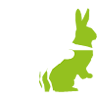Disease: African swine fever
This page provides general information about this condition. Text can be revealed by clicking on the green headers. Links to press releases, results from DWHC investigations as well as other useful documents and relevant literature available on the DWHC website can be found at the bottom of the page.
Pathogen
African Swine Fever is an infectious notifiable disease of swine caused by the African swine fever (ASF) virus. Most strains of this virus are highly virulent meaning that they are capable of causing serious disease in infected animals. However, some strains are less virulent so the range and extent of clinical signs varies but can include death of domestic and wild pigs, with serious economic impacts. ASF virus is not related to the virus that causes classical swine fever.
Susceptible species
ASF virus is only infectious to swine and soft ticks (Ornithodoros). Disease transmission and spread can occur in a variety of ways:
- Direct contact between infected and non-infected animals, particularly the blood of an infected animal
- Via tick bites in countries where Ornithodoros ticks are found (not in the Netherlands). It is possible that other biting insects can act as vectors.
- Consumption of ifected pork or pork products as the virus can survive for months in pork that is uncooked or insufficiently heated
- Via objects that have been contaminated with blood or other material from an infected animal
Signs in animals
The ASF virus strain circulating in the Baltic states and Poland is highly pathogenic to both domestic and wild pigs. Infected animals die within a few days of becoming infected and mortality rates can reach 100%. Clinical signs include high fever, swollen lymph nodes and hemorrhages in the skin. On post-mortem exam hemorrhage is seen in multiple organs, the spleen is enlarged and swollen lymph nodes are red. Other strains of the virus may cause persistent subclinical disease in infected animals.
Symptoms in people
ASF does not affect humans.
Preventative measures
These measures are aimed at the general public, and in particular at hunters and wildlife rangers coming into contact with wild swine.
- Wild swine cadavers should not be handled; contact the NVWA via the National body for animal disease on 045–5463188 (this is a notifiable disease so ensure that you keep this number in your contact list).
- Unconsumed, uncooked pork products should be disposed of in an appropriate manner.
- Wear gloves when handling wild swine and ensure that you wash your hands thoroughly with soap and water after contact with these animals.
- Any vehicles (including wheel arches), boots and other materials that have been in contact with wild swine must be thoroughly rinsed prior to leaving the area.
- After a hunt, change your clothes before leaving the area and ensure that dirty clothing is washed at a temperature of at least 60°C.
- After contact with wild swine wait at least 72 hours before visiting pig farms; different shoes should be worn when entering the property.
- When hunting abroad check with the relevant authorities what the local rules and regulations are and find out which diseases are endemic or have been found in animals in the area.
Anyone working with domestic pigs is advised not to hunt in areas where ASF is found.
External information
Research results
No researchresults found.
Projects
No projects found.
Overige berichten
- Germany: African swine fever infection found in new area (19/06/2025)
- Update: African swine fever found on the other side of the Rhine (12/07/2024)
- Albania: African swine fever found in wild boars (18/03/2024)
- Montenegro: African swine fever found in wild boars (22/01/2024)
Publications
No publications found.



